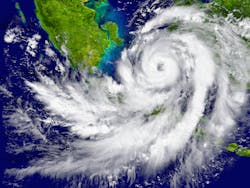NSC Urges East Coast Residents to Prepare for Hurricane Florence
As Hurricane Florence plans to make landfall in the next few days, the National Safety Council (NSC) is calling for Americans living on the East Coast to take proper precautions.
Flash floodings, devastating damage, injuries and death can occur during severe weather and natural disasters. In 2017, 59,985 weather events resulted 592 deaths and 4,270 injuries. Flash floods, tropical storms, and heat waves resulted in the most deaths during 2017, according to the NSC
The agency advises families to keep an emergency kit at home and in the car. Kits should contain basic needs to sustain a family for at least 72 hours.
When putting together an emergency response plans, families and businesses should practice various methods of evacuation or identify places to seek shelter, make emergency contact lists in case family members become separated and learn how their community alerts residents when severe weather or a natural disaster are imminent.
The NSC says the following measures should be take before and during the following natural disasters:
Hurricanes:
- Board up windows and secure loose items like patio furniture
- Establish an assembly point for family members to meet if separated, and choose one person everyone can contact with their whereabouts and status
- Take shelter in a sturdy building; avoid isolated sheds or other small structures, open areas, hilltops, the beach or boats
- If you are driving in heavy rain, try to safely exit the road, stay in the vehicle and turn on the emergency flashers
- Never drive into flooded areas; if flood waters rise around your car, abandon the car and move to higher ground
- Avoid contact with electrical equipment, cords, metal and water
- Listen for warning sirens, stay away from windows and exterior doors, and seek shelter in a bathroom or basement
- Stay indoors until authorities tell you it's safe to go outside
Flash floods:
- Know your proximity to rivers, streams and dams
- During heavy rain, avoid underpasses, underground parking garages and basements
- Don't walk in water above your ankles; you can be swept off your feet in as little as 6 inches of rushing water
- Turn off the electricity and other utilities
Sample emergency kits and plans can be found at nsc.org/emergencykit.
About the Author
EHS Today Staff
EHS Today's editorial staff includes:
Dave Blanchard, Editor-in-Chief: During his career Dave has led the editorial management of many of Endeavor Business Media's best-known brands, including IndustryWeek, EHS Today, Material Handling & Logistics, Logistics Today, Supply Chain Technology News, and Business Finance. In addition, he serves as senior content director of the annual Safety Leadership Conference. With over 30 years of B2B media experience, Dave literally wrote the book on supply chain management, Supply Chain Management Best Practices (John Wiley & Sons, 2021), which has been translated into several languages and is currently in its third edition. He is a frequent speaker and moderator at major trade shows and conferences, and has won numerous awards for writing and editing. He is a voting member of the jury of the Logistics Hall of Fame, and is a graduate of Northern Illinois University.
Adrienne Selko, Senior Editor: In addition to her roles with EHS Today and the Safety Leadership Conference, Adrienne is also a senior editor at IndustryWeek and has written about many topics, with her current focus on workforce development strategies. She is also a senior editor at Material Handling & Logistics. Previously she was in corporate communications at a medical manufacturing company as well as a large regional bank. She is the author of Do I Have to Wear Garlic Around My Neck?, which made the Cleveland Plain Dealer's best sellers list.
Nicole Stempak, Managing Editor: Nicole Stempak is managing editor of EHS Today and conference content manager of the Safety Leadership Conference.
